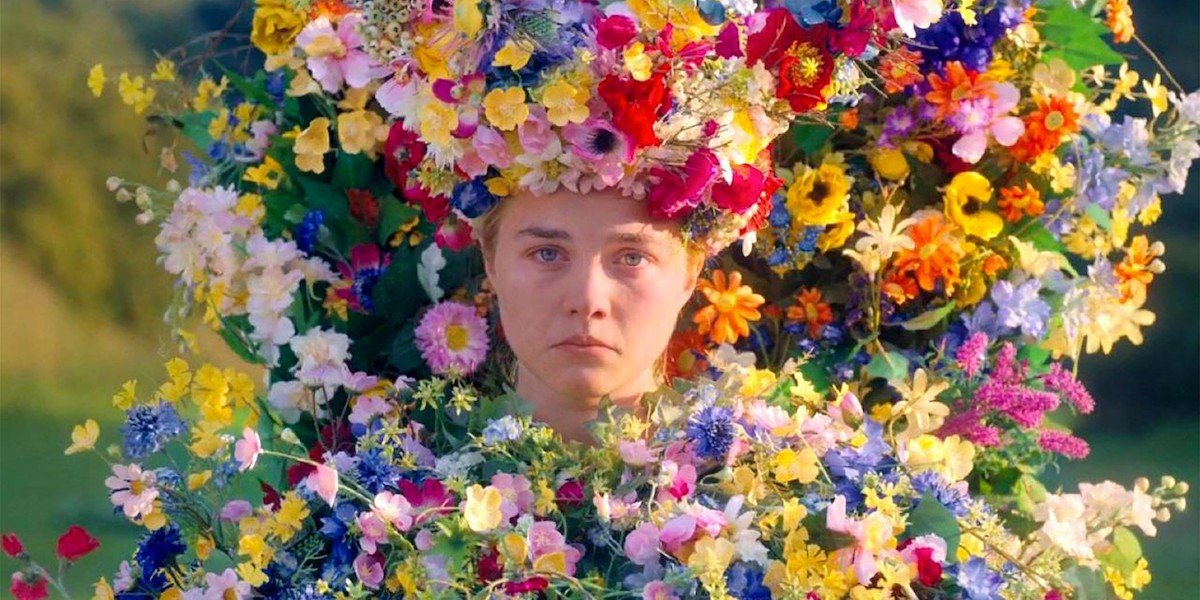Hereditary Ending Explained: What Happened To Peter?
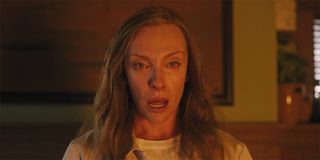
SPOILER WARNING: The following article contains spoilers for Hereditary. If you have not yet seen the film, proceed at your own risk!
Ari Aster is one of a few filmmakers in recent years who has made a huge splash with a horrific debut film, others being Jordan Peele, Robert Eggers, and Jennifer Kent, but make no mistake: Hereditary is an exceptional and special piece of storytelling. Introducing audiences to the hyper-detailed craft of its writer/director, the film grips you with its family drama, and then makes you scream as it invades your mind with slowly escalating witchcraft. It all culminates in an ending that horror fans will be talking about for years and years – and it’s that ending that we are here to examine today!
Having already dug deep into the final act of Ari Aster’s Midsommar, we’re taking a step back through time to dive into the filmmaker’s first feature effort… and to say that there’s a lot to unpack would be a severe understatement. Hereditary’s ending is a wonderful culmination of all the film’s complexity and insanity, so we’ll start with a reminder of how things go down in the final minutes of the film.
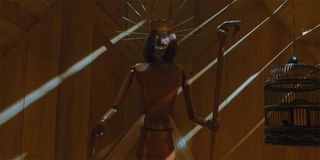
What Happens At The End Of Hereditary?
There’s no exact science in pinpointing where the end Hereditary begins (mostly because of the aforementioned slow escalation), but we’ll start this recap immediately after Annie (Toni Collette) throws Charlie’s journal into the fireplace and in effect causes her husband Steve (Gabriel Byrne) to spontaneously immolate. That night, Peter (Alex Wolff) wakes from his midday nap – still in pain from the incident at school that caused him to smash his face against his own desk multiple times. Outside he sees an ominous glow in the treehouse, and as he stands, he observes a glow coming from the ground… and his mother impossibly crawls on the wall behind him.
Peter leaves his room to the fly-filled hallway, the attic still open from when Steve went up earlier, and he makes his way downstairs. When he gets to the living room he sees that all of the furniture has been moved away, and by the fireplace is the charred corpse of his father – identifiable by his wedding band. As Annie can be seen hanging in the corner of the ceiling behind him Peter turns to see a naked man standing in the doorway to the kitchen smiling – the same man who smiled at Charlie at the funeral.
When Peter turns back around, Annie is gone, but then she leaps from another corner of the room and chases him up the stairs. He gets to the attic and pulls up the ladder, and he pleads with his mother to stop banging on the door. Just as you contemplate to yourself how it’s possible that she could be banging a door on the ceiling, we see that Annie is repeatedly bashing her skull against the closed hatch.
The banging stops suddenly, and Peter is left to observe the attic. The space is lit with candles, and while the body that Annie discovered earlier is gone, there is an outline in its place with a yearbook photo of the teenager where the head wasn’t/should have been (the eyes spookily poked out). Peter begins to talk to himself and slap his own face, trying to convince himself that he’s asleep – but then a sloppy crunch turns his attention to the greatest horror of all: the sight of his own mother strung up by the ridge of the roof and slowly using a razor wire to decapitate herself. This sight is interrupted by Peter discovering a trio of naked people in the attic with him, and he takes a quick dive out the window, crashing through the glass.
CINEMABLEND NEWSLETTER
Your Daily Blend of Entertainment News
As Peter lies unconscious in the garden, we hear the sawing continue until a final cut results in the sound a body hitting the ground in the attic. Meanwhile, a bright ball of white light drifts down and lands on Peter’s back.
Peter stands up in time to see the headless body of his mother mystically floating up and into the treehouse. Reminiscent of his deceased sister Charlie (Milly Shapiro), he clucks his tongue, and then as though in a trance begins to walk toward the treehouse – more naked people lined up along his path. As he makes his way up the ladder and into the treehouse, he discovers a group of strangers bowing, and sees a wood model that is adorned with Charlie’s decapitated head wearing a wooden crown, and the familiar symbol from throughout the movie carved into its chest. The headless bodies of Annie and his grandmother sit in front of it in a bowed position.
Slowly turning, he then sees a framed black and white photo of his grandmother sitting on a wooden chair, the engraved plate beneath it reading “Queen Leigh.” From off screen we hear the calm voice of Joan (Ann Dowd), who assures “Peter” that he’s safe, taking the crown off Charlie’s head and putting it on his while saying,
Hey, hey, it’s alright. Charlie, you’re alright now. You are Paimon, one of the eight kings of hell. We have looked to the northwest and called you in. We’ve corrected your first female body, and give you now this healthy, male host. We reject the Trinity, and pray devoutly to you, great Paimon. Give us your knowledge of all secret things. Bring us honor, wealth, and good familiars. Bind all men to our will as we have bound ourselves for now and ever to yours.
As Joan leads the group in praising Paimon’s name, we quickly zoom out to see the treehouse as one of Annie’s art pieces, and the film cuts to black.
While some elements of Hereditary’s ending are self-explanatory, there are other aspects that may have you scratching your head a bit… but we have you covered!
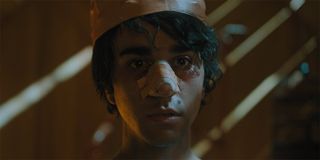
What Happened To Peter?
Starting with a bit of the self-explanatory stuff, Joan didn’t just make a slip and call Peter by the wrong name. At the end of Hereditary, it appears that Peter’s soul is no longer represented in his own body, as the devil worshipers have performed a ceremony that has given control of him over two new hosts: Charlie and the demon King Paimon. The first bit of evidence showcasing the former’s presence is the tongue clucking demonstrated when “Peter” rises from his unconscious state, but explaining why Paimon couldn’t just occupy Peter alone requires reflecting on particular details provided earlier in the film.
As we learn through the funeral and support group scenes, Annie and her mother had an extremely complicated relationship, and that very much included the time that Leigh got to spend around her grandchildren. Annie completely cut ties with her after Peter was born, not wanting him to have any influence over him, but there was an attempt at reconciliation when Charlie was born. This is an opportunity that Leigh enthusiastically took, even going as far as to insist that she be the one who fed Charlie as a baby. This was the start of a complicated grooming process, of which we don’t know all of the details.
There are little hints dropped along the way that there is a greater influence at play, such as Charlie bemoaning that her mother wishes she was a boy, Peter learning in English class about tragedy in fatalistic circumstances, and the symbol of King Paimon engraved on the telephone pole that winds up impacting with the young girl’s head at high speed. There is also the symbolism in Charlie essentially being a found object artist who re-appropriates things for her own purposes. However, the scene where the core of the ending is spelled out is when Annie discovers her mother’s research and spell journals.
After discovering the friendship between Joan and Leigh, Annie finds a highlighted passage in a book that states that summoning King Paimon requires a vulnerable vessel, and that the demon has been known to be “livid and vengeful when offered a female host.” Applying what the movie tells us, this means that Peter would have been the ideal target from the beginning, but Annie keeping him away from her mother prevented his preparation for the ritual. Changing course when circumstances changed, Leigh and the other cultists prepared Charlie for the ritual instead, and then made the necessary moves to transfer her soul into her brother’s body so that Paimon could be invoked.
With the majority of the occult action happening off screen, the full extent of the ceremony is unclear, but evidence suggests that part of it was getting Annie to hold a séance with her family so that Charlie’s soul would return to the house. Based on the illustration of King Paimon in the book, it also appears that three decapitated heads are required, as the demon rides with them attached to his saddle. If you’re keeping count, the cult gets these heads from Leigh (presumably willingly), Charlie (who loses her head thanks to the telephone pole), and Annie (who saws her own head off).
Horrible? Most definitely. But “Horrible” and “Horror” have the same root, and in Hereditary what we see is horribleness executed brilliant.
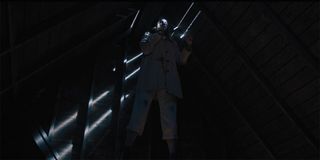
What Ari Aster Says About The Hereditary Ending
One thing that’s interesting to note about Hereditary is that it didn’t fully make up its own mythology. If you do your own independent research (which may be how you found this article in the first place) you’ll discover that King Paimon is not an original creation, but instead a demon that real people follow and worship.
Being the meticulous filmmaker that he is, Ari Aster dug into the histories and stories, but it didn’t precisely lead him to change his life and start worshiping a new deity. Rather, while Aster is a director who has a habit of making his audiences stare at the truly horrific, there was only so much that he could stomach of the research before he had to shut it all down. Speaking with Vox the filmmaker said,
I did do a lot of research, especially into witchcraft and how one might cast a spell and how to conduct one of these rituals. It was very disturbing for me, and I had to move away from it once I’d gotten what I needed.
Taking only what he needed, Aster seems fairly positive that he got some details wrong, but knowing that he’s not demon worshiper will hopefully excuse any mistakes. He continued,
I’m sure that I’m going to be called out by occultists for taking liberty where I might have. But ultimately, I have no ties to the occult. In any way. I’m just a Jewish guy. I’m just a neurotic Jewish guy.
As for the larger themes of Hereditary, the horror genre makes for a wonderful exploration of the true drama that is at the heart of the film, which is the deep fear that all of us possess in times of grief and the way it forces us to grapple with our own mortality and where we come from. Speaking with Vanity Fair in a separate interview, Ari Aster explained.
In true melodramatic fashion, I wanted a film that really honored the feeling of these people who are really suffering, where the fears that are being exploited and investigated are impossible to remedy. And they aren’t irrational. So, you know, a fear of death, or a fear of abandonment, or a fear of being responsible for something horrible that happens to somebody in your life that you care about, and having to live with the guilt of that… I knew if I wanted to make a horror film, I wanted to make one that really got to people. And I don’t know how to do that but to think about what scares me.
If you’re now feeling inspired to watch Hereditary all over again, you can do so instantly if you are an Amazon Prime subscriber, as it is currently available to stream on their service. Those who aren’t members can purchase digital copies from online retailers, and also find the film on Blu-ray and DVD.

Eric Eisenberg is the Assistant Managing Editor at CinemaBlend. After graduating Boston University and earning a bachelor’s degree in journalism, he took a part-time job as a staff writer for CinemaBlend, and after six months was offered the opportunity to move to Los Angeles and take on a newly created West Coast Editor position. Over a decade later, he's continuing to advance his interests and expertise. In addition to conducting filmmaker interviews and contributing to the news and feature content of the site, Eric also oversees the Movie Reviews section, writes the the weekend box office report (published Sundays), and is the site's resident Stephen King expert. He has two King-related columns.
Most Popular





